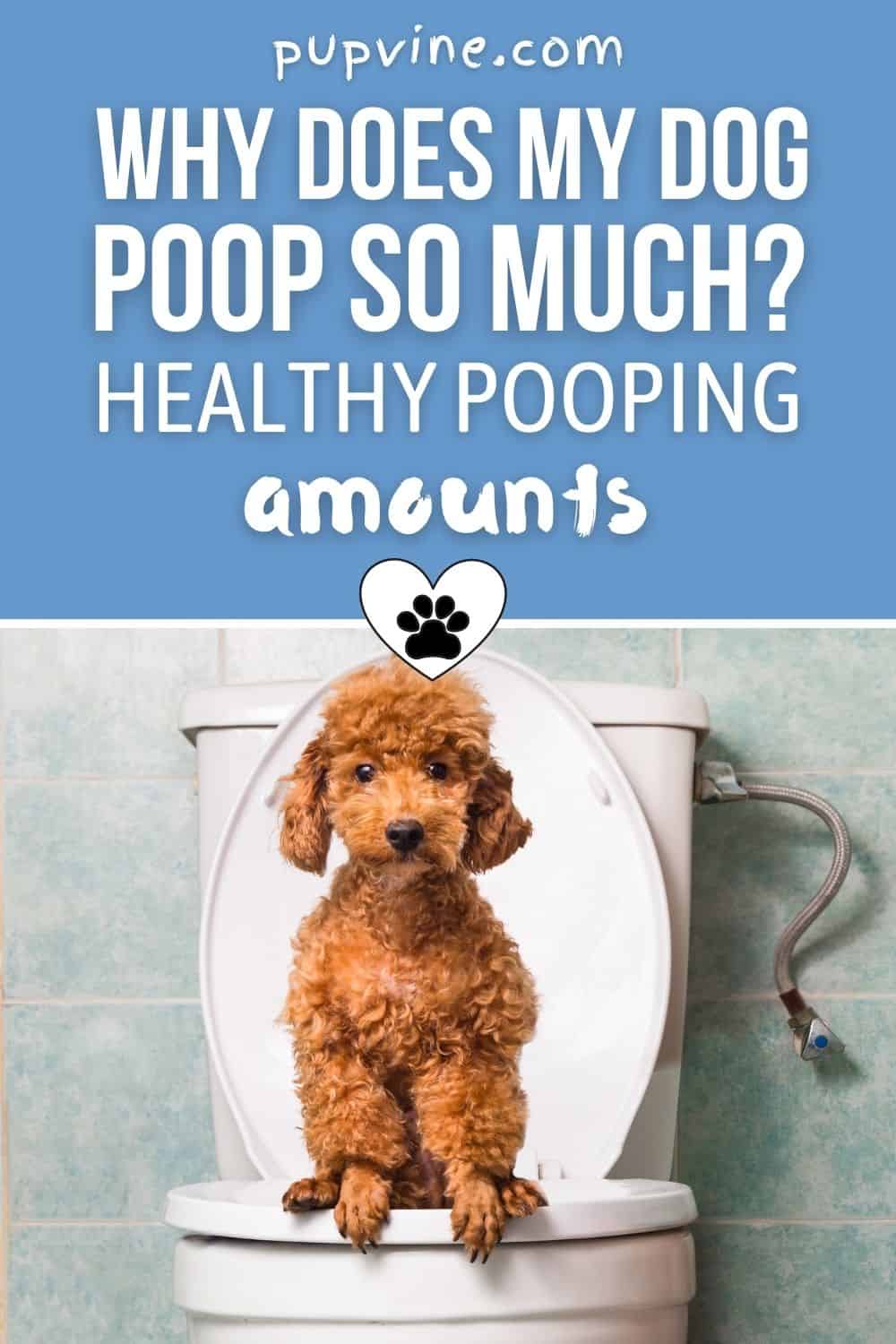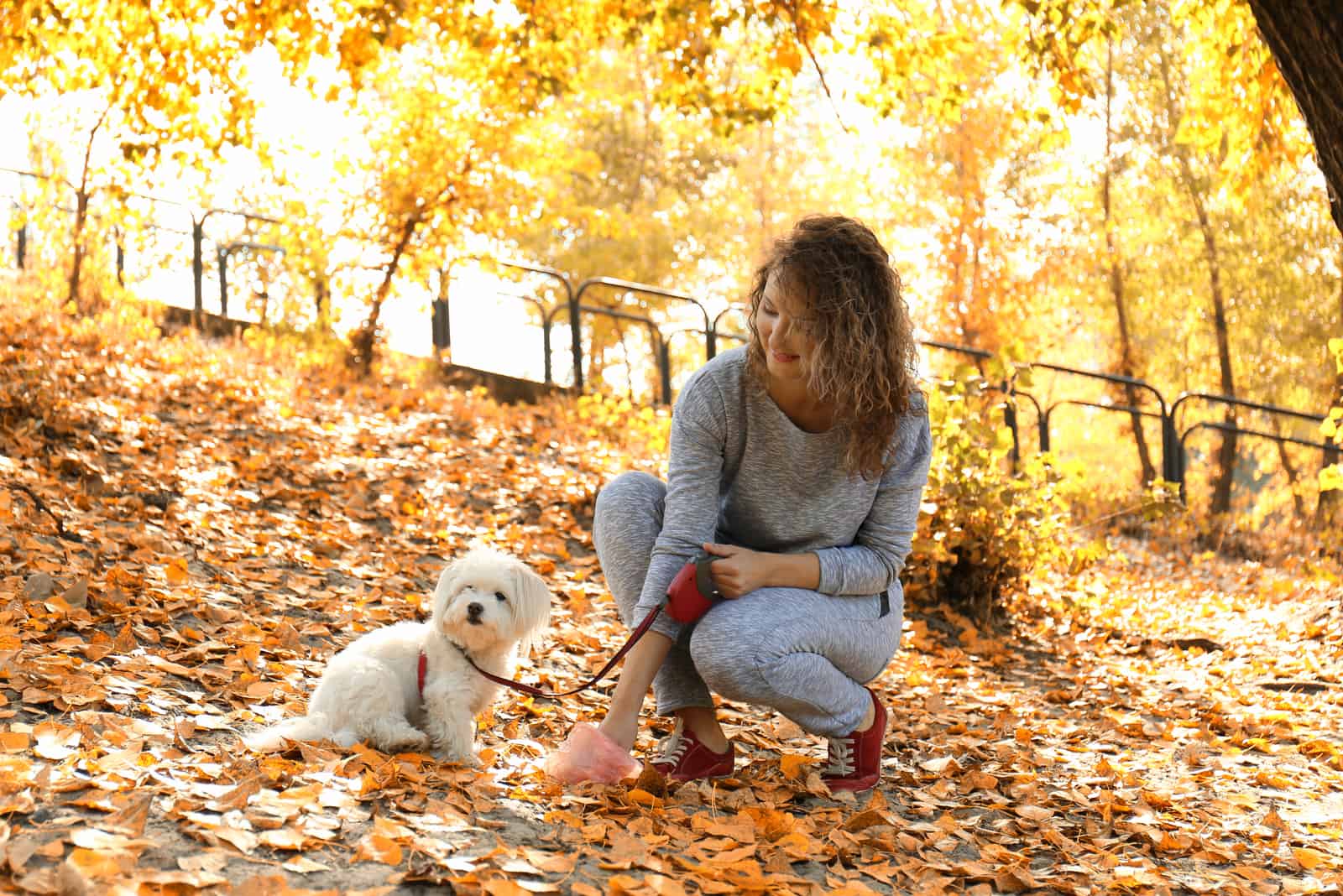Picking up landmines is not the most fun part of being a dog owner, but it is important for more than one reason.
While discussing poo will make anyone uncomfortable, feces can, in fact, let you know a lot about your pooch’s health. Regular bowel movements are vital for any living being, and this includes dogs.
If your dog doesn’t poop for a while, you know this is a bad sign. Constipation is a common issue in not just dogs but humans, as well. No one likes the feeling of not going to the toilet several days in a row.
At the same time, if your dog poops too much, this can also be a bad sign. But how can you know when your pup is ‘doing his business’ a healthy amount and when he’s going overboard?
If you’ve ever wondered, ‘Why does my dog poop so much?’ or ‘How much should a dog poop?’, you’re in the right spot.
We’ll answer that and many other poop-related questions you may have. Read on!
How Many Times Should A Dog Poop?
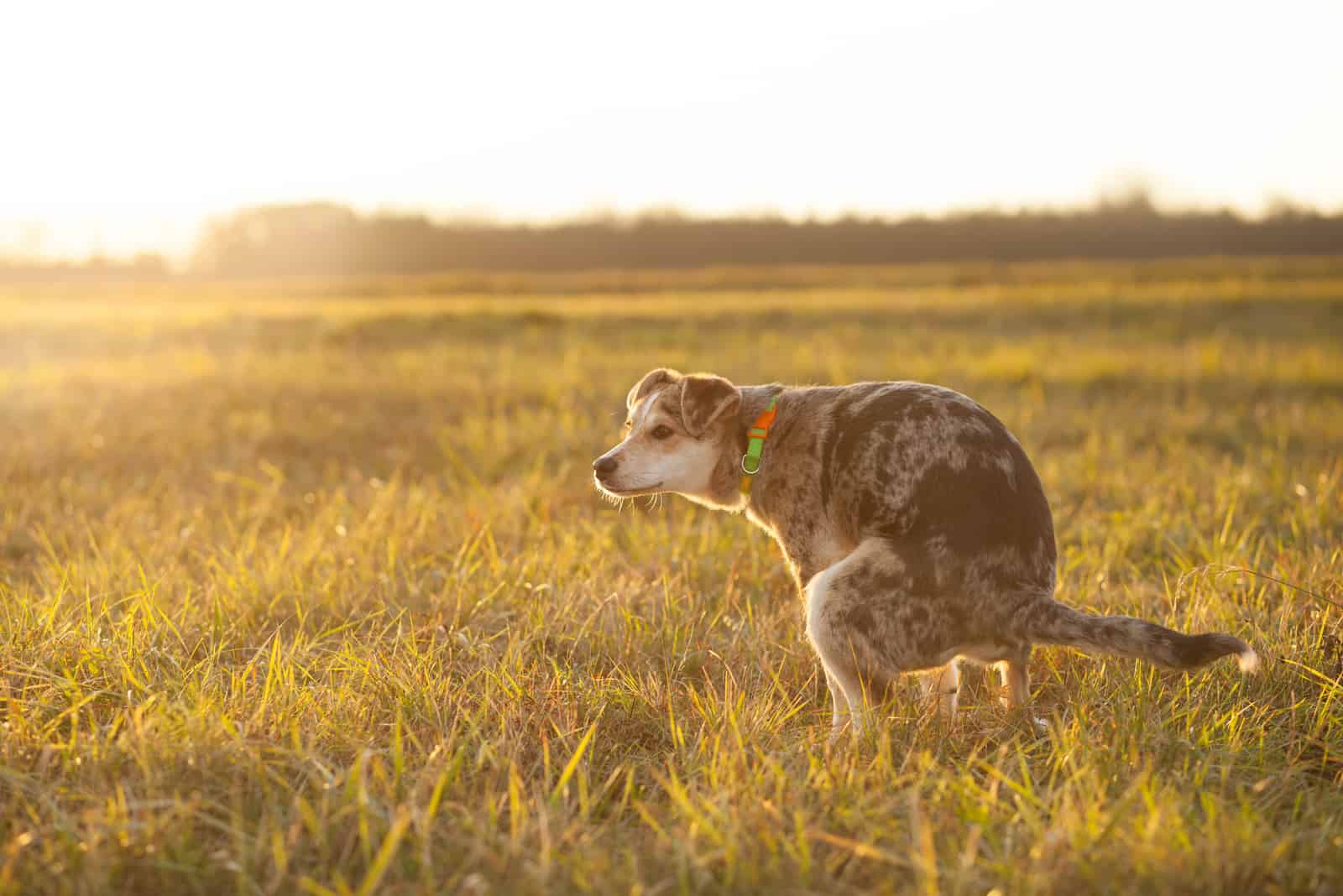
There isn’t a definite answer to judging what a healthy amount of pooping is, as this depends on many factors, such as a dog’s size, activity level, diet, age, and the number of walks they take.
Overall, a dog should go potty between one and five times a day. Puppies or senior dogs who eat small quantities of food several times a day are expected to poop more than healthy adult dogs with a normal diet.
Depending on their specific condition and any medication they might take, dogs with certain health issues might also poop more or less.
Most dogs develop habits early on, so they’ll get used to pooping a certain number of times a day. In fact, they’ll usually have the urge to ‘go’ around the same time each day.
No matter how many times a day your dog poops, as long as this doesn’t suddenly change, this is completely normal.
Read Also: Puppy Pees A Lot: Why This Happens And How You Can Help
What Affects The Pooping Amount?
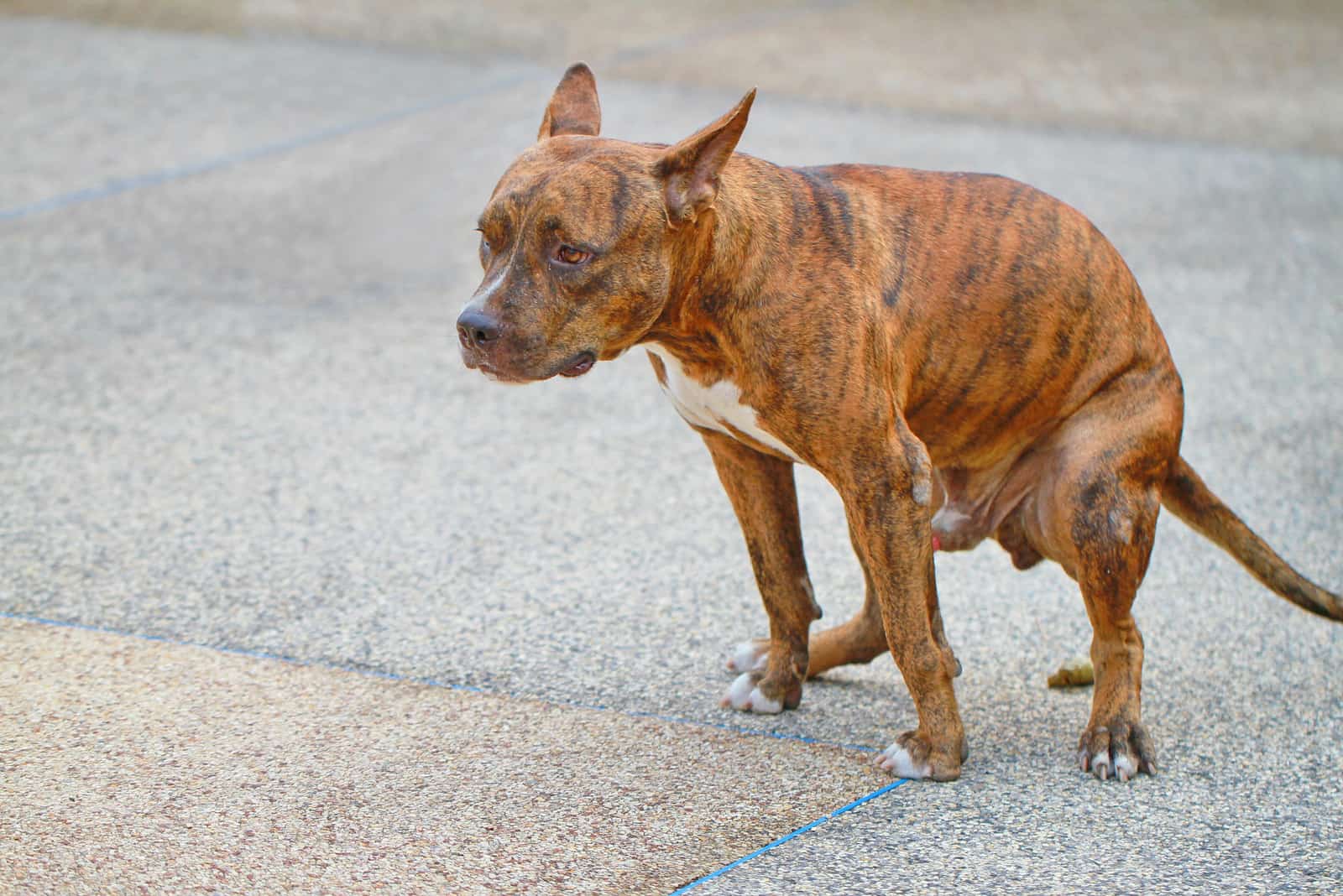
The most common cause behind any unusual dog’s bowel movements is food.
If your pup eats an excessive amount of food, he’ll poop more than usual, as there is more food to expel from his large intestine.
A big mistake people make is feeding their dogs according to their current weight. Instead, you should feed your pet according to its ideal weight, especially if your pup has recently gained some weight. The same goes for dogs that should gain or lose a few extra pounds.
The quality of your dog’s food also impacts the amount and consistency of its feces. If you give your pooch a balanced, raw food diet, he’ll have more frequent bowel movements than a dog that only eats dry food.
This doesn’t mean that there is anything wrong with feeding your dog kibble. However, you need to ensure the food you’re buying is of high-quality. Always look at the ingredients, no matter what type of dog food you’re getting.
Dog kibble tends to use fillers, such as corn, as this keeps the food affordable. However, corn can be difficult to digest, and it will simply pass through, causing your dog to poop more. At the same time, this lack of nutrients will prevent your pooch from growing healthily.
Feeding your pup table scraps isn’t a good option, especially if you want your pet to have a healthy stool. Many human foods aren’t good for dogs, and they can cause an upset stomach or diarrhea. Some foods are outright toxic to dogs, so be mindful of that as well!
Some of the foods that can cause diarrhea or constipation include:
• Pesto
• Any spicy food
Even some foods safe for dogs can be harmful if fed in large amounts. This is especially the case with fruits such as fig newtons, guavas, or durian.
Some dogs also love to eat cat food. This may sound harmless, but if your dog eats cat food too often, this can cause changes in his digestion and will not do any good to his health in the long term. For additional help on this problem, read our article on how to stop dog from eating cat food.
A dog’s activity level can also impact his pooping amount. More active dogs also have active digestive systems, and they will poop more often than lazier canines.
Finally, many health issues might cause your dog to poop more. If you notice your dog pooping more often than usual and you haven’t changed anything in his diet, take him to the vet as soon as possible.
Some health conditions that can affect the type and amount of dog’s stool are:
• Diabetes
• Inflammatory bowel disease (IBD)
• Diseases of the large intestine or gallbladder
• Inflammation of the colon (colitis)
Even if your pup doesn’t have a standard medical issue, he might have intestinal parasites, such as roundworms or hookworms. You should still get your vet to check that out.
Why Do Puppies Poop More Than Adult Dogs?
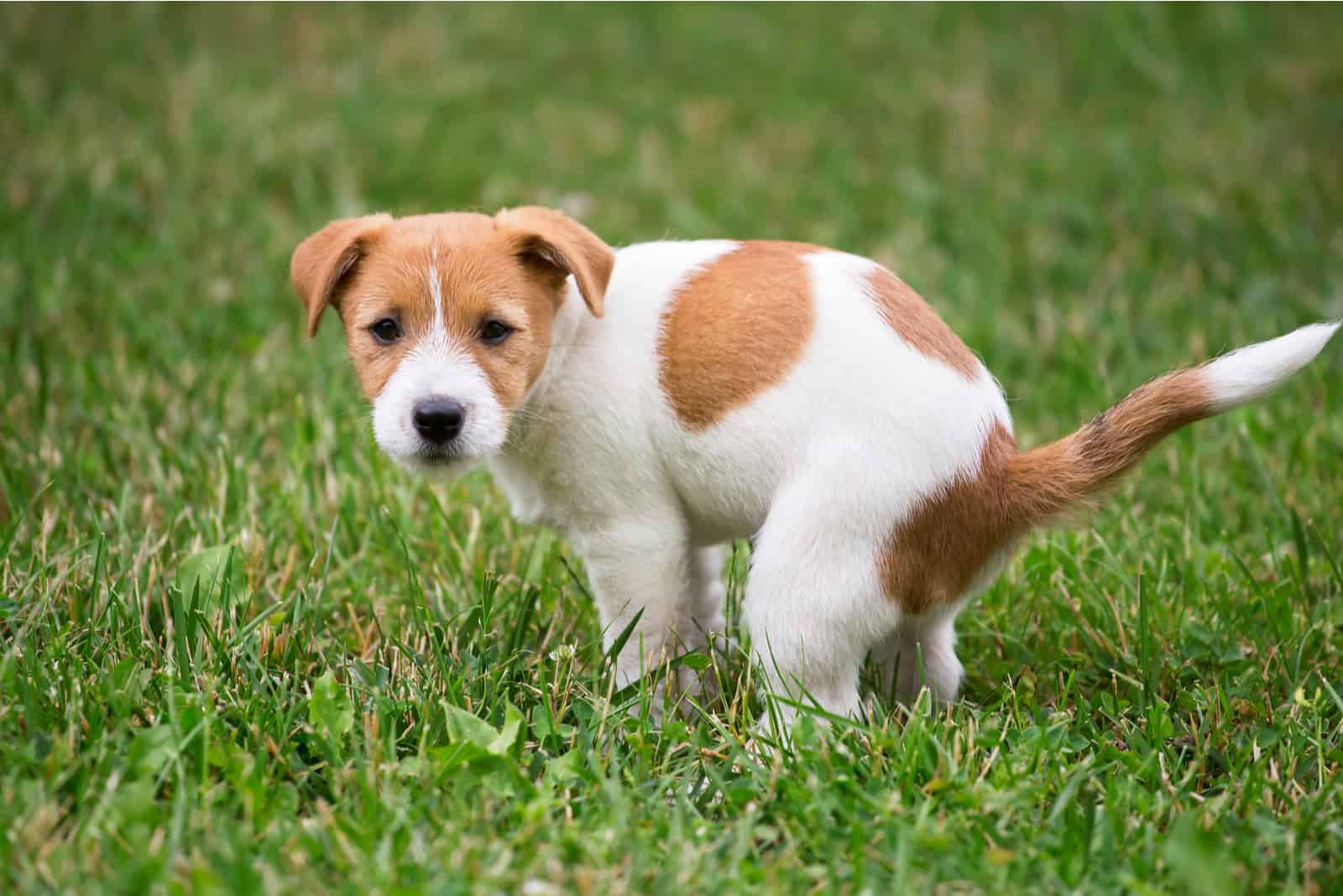
One of the first things new dog owners notice is that their puppy is like a pooping machine whose only purpose is to keep you close to the poop bags!
Fortunately for you, this stage is temporary, and it’s, in fact, perfectly normal. Puppies will always poop more than adult dogs, and there are several reasons behind this.
First off, puppies have much smaller stomachs compared to adult dogs. They require small portions of food many times a day to grow strong and healthy, unlike adults that are fed two to three times a day.
This constant stream of food will keep your pup’s digestive tract moving, which will result in a steady flow of poop you need to deal with.
At the same time, puppies have a much faster metabolism than adult dogs, alongside their high energy levels. Their bodies will digest food much faster, which means speedier poop creation.
This doesn’t mean you should overfeed your puppies, as they too can become overweight or even develop serious health issues, most notably skeletal problems.
So if you have a young puppy and you’re scared because of how much he poops – don’t worry. This is perfectly normal, and your pup will grow out of it in time.
In fact, by the end of his first year, your dog’s pooping schedule should calm down.
How To Tell If Your Dog’s Poop Is Healthy
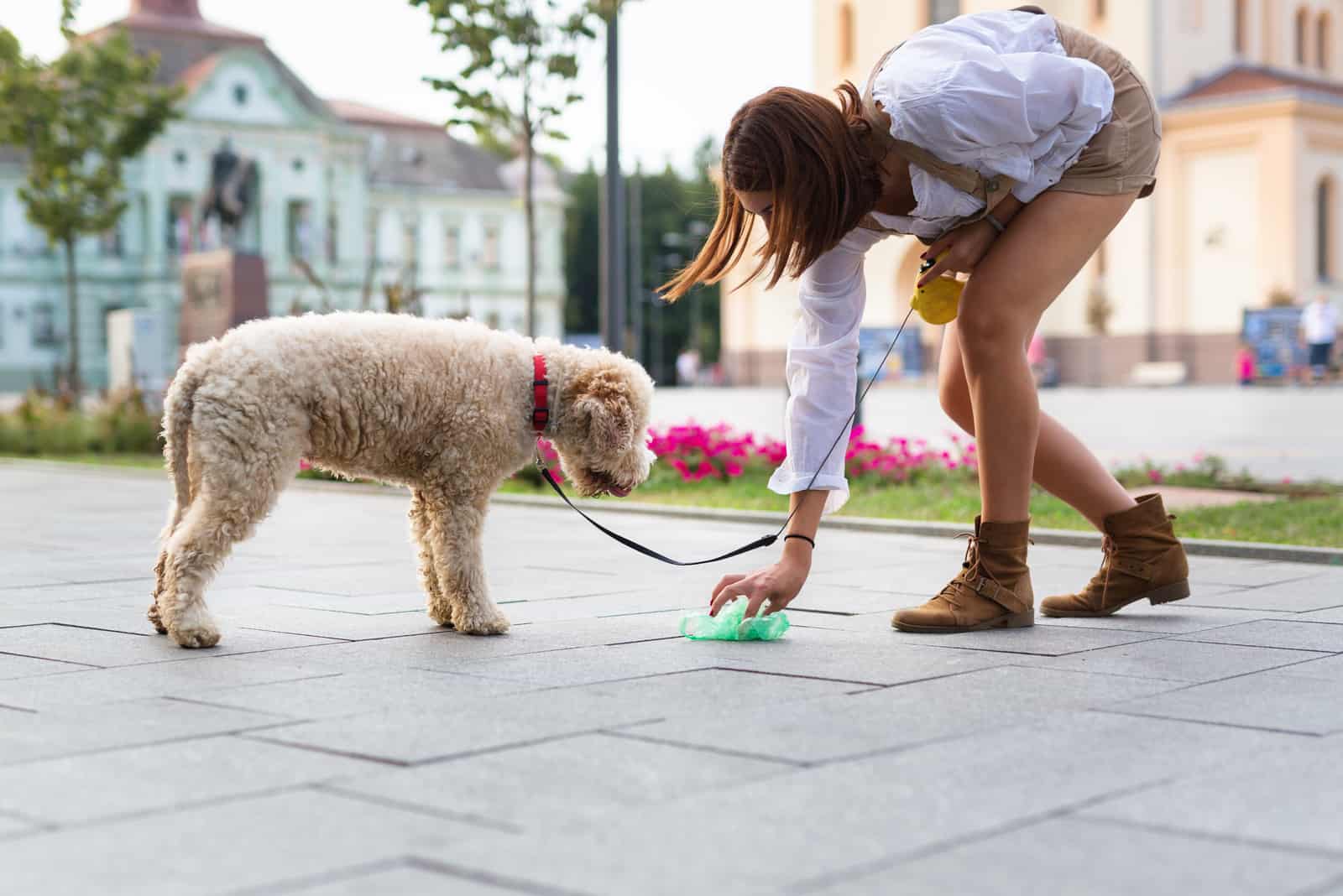
The easiest way to determine if your pup’s poop is healthy is to evaluate the 4 Cs of a healthy stool. This includes:
Color
A healthy stool should be brown colored and resemble a Tootsie Roll. This color results from the bile your dog’s digestive tract uses to break down any food or nutrients your pet takes in.
There can be some variation in the shade depending on your dog’s diet and how well hydrated he is. The healthiest of stools are always chocolate brown in color.
However, other colors typically mean that something is wrong.
For example, a black stool can mean there is bleeding in the upper gastrointestinal tract, red streaks in stool indicate bleeding in the lower gastrointestinal tract, while grey or yellow stool that resembles clay is a sign of gallbladder or pancreas issues.
On the other hand, white specks in dog’s poop can mean a parasite infection, but they might also be perfectly normal. This is why it’s important to keep track of what your pup’s eating and where he’s been, and to be aware of when to contact your vet.
If you notice a change in your pup’s stool color, rush him to the vet. It would be wise to take a stool sample with you too.
Read more on this topic in our dog poop color chart.
Consistency
Human poop has its own Bristol stool scale that you can use to check your gastrointestinal tract’s health by looking at the consistency of your feces. A similar scale exists for dogs as well.
The dog poop scale goes from 1, indicating small, hard pellets, to 7, which means your dog has a loose runny unformed stool. Unlike in humans, the ideal poo consistency for dogs is around two.
You shouldn’t panic if your dog has super soft or super hard stool every once in a while. This is perfectly normal, as we all sometimes have minor stomach issues. However, if they are followed by other worrying symptoms, or if they are long-lasting, contact your vet, just to be sure.
Content
No one expects you to go digging around in your pup’s poop, but a vet might do just that. They’ll be looking for fur, parasites, or even foreign material your furry friend might have eaten while you weren’t looking.
Since dogs poop outside, when collecting a sample, make sure it’s fresh and not contaminated by outdoor pests.
Coating
A healthy poop doesn’t have any coating. If you pick it up, you should be able to do so easily and without creating a mess.
Any type of mucous coating on a dog’s poop could mean that something’s wrong. From diarrhea to colitis, many health problems can cause mucous in stool.
Small streaks of blood are also common, especially if your doggie passed a hard stool. These are simply a sign of straining. However, if there are plenty of streaks or if the poop is coated with blood, contact your vet at once.
Why Has The Poop Changed?
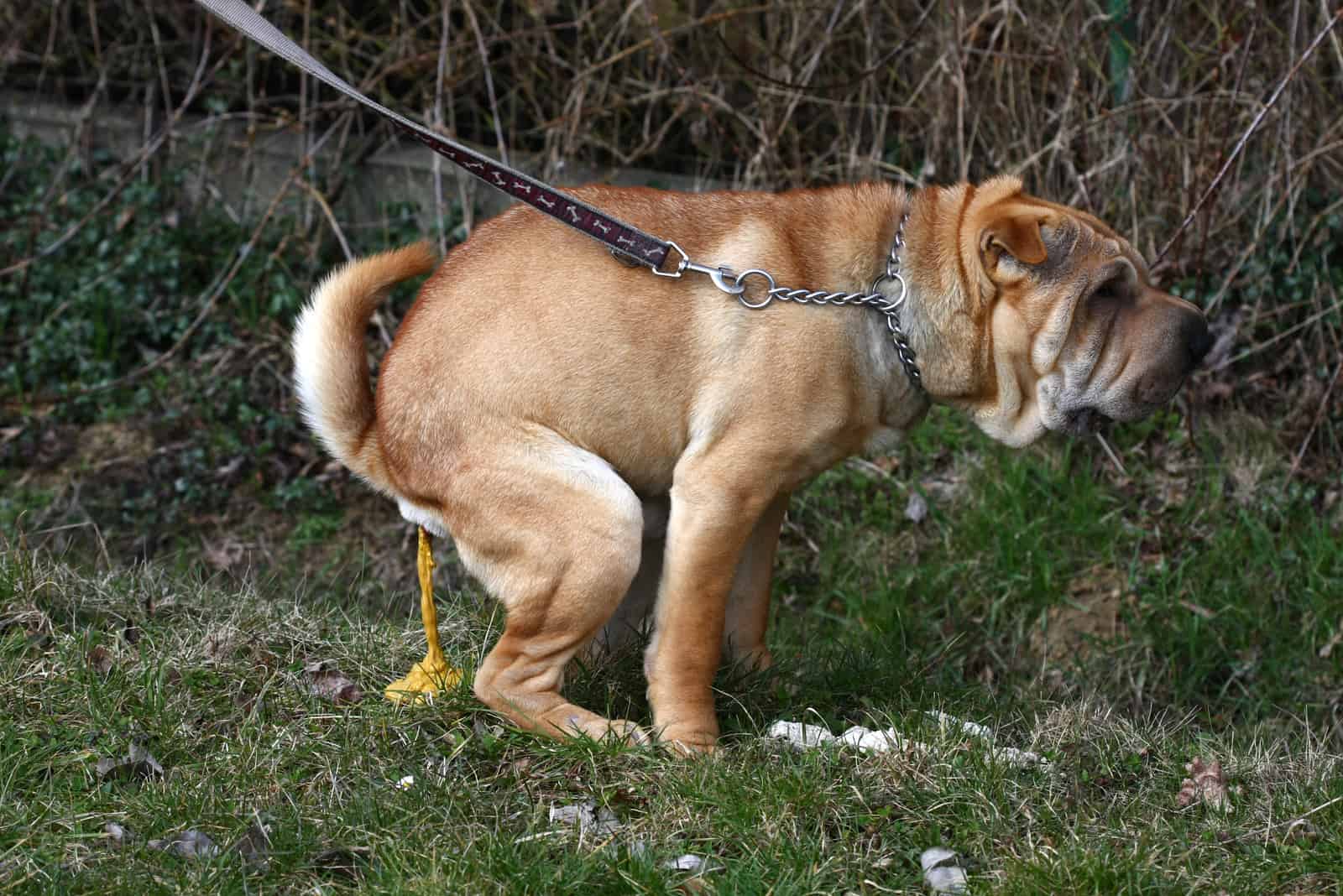
There can be many reasons why your pup’s poop has changed in frequency, texture, and color. Most of them aren’t a cause for concern, and everything will go back to normal soon.
Still, we’ll go over some of the most common reasons your dog’s pooping schedule has suddenly changed.
Read Next: Why Does My Dog Walk And Poop? 14 Answers For You
Changed Diet
Have you introduced a new food to your pooch or switched his diet from kibble to wet food? Have you started giving him tuna or carrots? Maybe he ate too many treats, or something he ate was high in fat or fiber. This can happen if he eats pastry, suck as pretzels or bagels.
Any diet changes can, in return, change how often your dog will go potty. This shouldn’t concern you. Your dog’s pooping schedule might just be finding its new normal.
However, it would be wise to slowly introduce any new food to your pup, as you want his belly to get used to the new nutrients.
If you started giving pumpkin or sweet potato to your dog, expect to see a color change in his stool. This is nothing to worry about. Just make sure you aren’t giving him too much fat, as this can cause a runny stool.
Not just that, but foods with high-fat content can make your dog gain weight, and this isn’t something you want. Try to stay within your dog’s daily requirement of nutrients – this includes treats too!
Stress
If you’re wondering, “Why does my dog poop so much?” think if there is something that might be stressing him out. Did you get a new pet, move to a new home, or change the amount of time you spend outside the home?
Dogs react to stress in many ways. One of them is a change in stool. A stressed-out dog might even get diarrhea!
While some stressors can’t be dealt with, try to upset your dog as little as you can, even if you’re undergoing some serious life changes.
If the problem persists, try taking your dog to the vet or a professional trainer who might know how to help your dog feel better.
They Ate Something Bad
If your pup ate something that isn’t good for him, he might end up with an upset stomach. Dogs tend to eat whatever they can get their paws on without caring if it will cause them harm.
If you suspect your dog ate something off the sidewalk or from your trash can, monitor his behavior. If the stomach problems don’t go away after 24 hours, a vet visit is a must. Sometimes, diarrheas after food poisoning need to be treated by a professional.
Blockage
Just like us, pups can get constipated. Some signs of constipation include hunching but without pooping, vomiting, bloating, and abdominal pain.
While constipation is common and usually harmless, sometimes it might be caused by a blockage.
As we’ve already mentioned, dogs don’t really care about what they swallow. It isn’t rare for them to eat something that isn’t digestible and that can get stuck in their intestines.
Blockages in dogs are usually caused by swallowed toys, bones, sticks, rawhide, rocks, or even household items!
To prevent blockages, make sure toys are adequately sized and avoid feeding your dog bones.
The Right Diet
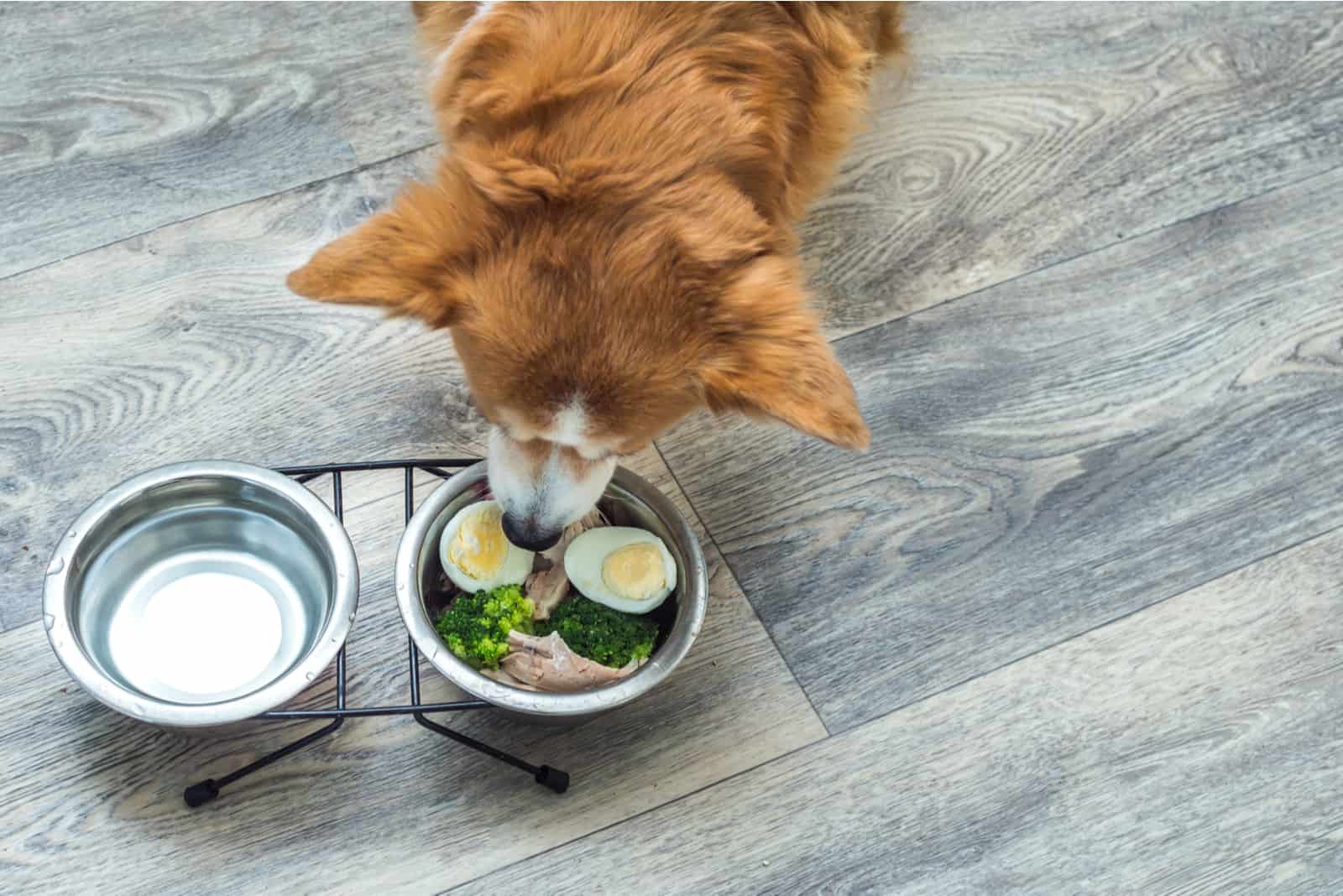
Most poo problems can be solved with the right diet. In fact, a dog’s feces is the best indicator of whether or not you’re giving your pooch a high-quality food.
For example, oversized stools mean your dog is eating too much or that you’re giving him food that isn’t nutritionally adequate, so he’s simply pooping it out. If you let it be, your dog can develop a nutrient deficiency, which can lead to many health conditions and diseases.
You should always look at the ingredients before you purchase a new type of dog food. The first ingredient should always be meat. Also, corn and other ingredients listed as ‘meal’ shouldn’t be high on the list. If they are – skip that brand!
A high-quality dog food, no matter if you’re looking for wet food or kibble, should have the right amount of fat, carbs, and proteins, as well as plenty of healthy vitamins and minerals.
While there is nothing wrong with feeding your dog kibble, a balanced, raw diet is the key to good poop. However, you can’t just throw some meat and veggies in your dog’s bowl and expect him to be perfectly healthy. Balanced nutrients are essential.
Healthy Poop Equals A Happy Pooch!
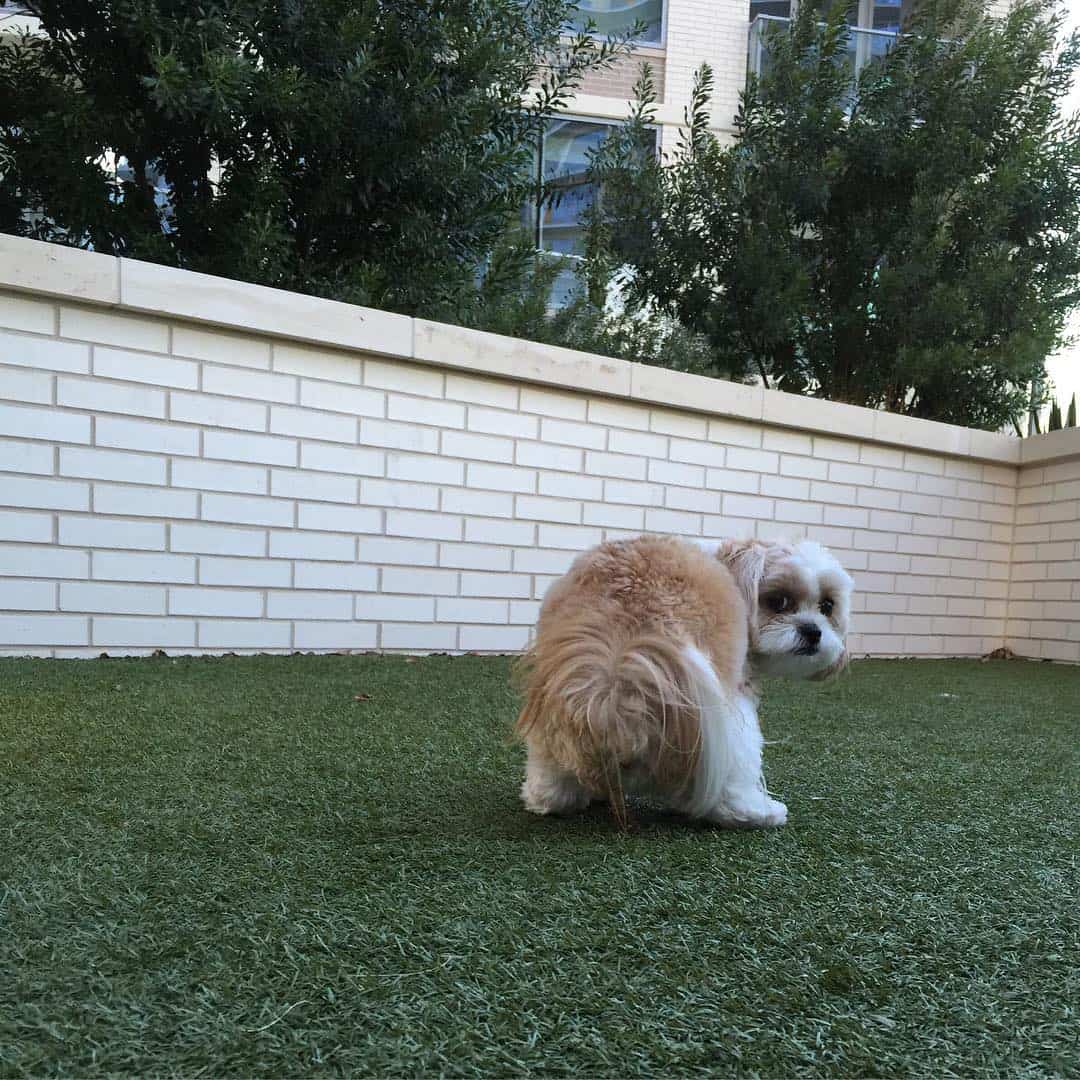
Photo from @hadleythemalshi
Your dog needs to have healthy stools, no matter his age. This is the best way to ensure his gastrointestinal tract is healthy. If a dog constantly has diarrhea or constipation, this is a sign that something is wrong.
Before you worry or ask yourself, “Why does my dog poop so much?” think if you have recently changed something in his diet or if something might be stressing him out.
A dog that continuously has issues with bowel movements can develop serious medical conditions. If anything else, it’s no doubt experiencing discomfort. With diarrhea, a dog is also in danger of dehydration, especially if it’s a puppy or an old doggy.
While you may feel that your pup needs some privacy when doing his business, monitoring his bowel movements and poop can be the key to understanding his health.
If you notice any change in the amount of poop amount or stool quality, you should contact your vet. They can rule out any serious health problems and help your strained pup get some relief.
